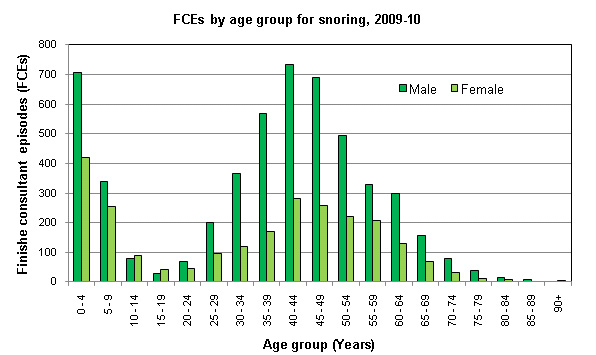
- BSSAA
- NHS Choices: snoring
- Inpatient data
- Self Service
HES on... Snoring
Around half of the UK population will suffer from snoring at some point in their lives. This article gives an overview of the condition and highlights related 2009-2010 HES data.
What is snoring?
Snoring is noisy breathing during sleep; it happens when the tissue inside your mouth, nose and throat vibrates. These vibrations are caused when air doesn't move smoothly through your airways.
Several factors can cause snoring, including the position you sleep in, your diet, drugs and allergies. In some cases, snoring can also indicate other conditions, such as sleep apnoea (where a person stops breathing for short periods while asleep).
Who does it affect?
According to the British Snoring & Sleep Apnoea Association, there are approximately 15 million snorers in the UK. Seventy per cent of people who snore are male; a finding that HES data supports.
In some cases, people suffering from snoring are admitted to hospital for further investigation and treatment. In England there were 7,674 finished consultant episodes for snoring (ICD-10 R06.5*) in 2009-10, with male patients accounting for 68 per cent of them.
 |
The graph above shows that most admissions for snoring occur with patients who are under 10 years old or 35 to 65 years old.
HES facts and figures
HES data for snoring (diagnosis code R06.5* in ICD-10) also shows that:
- the average (mean) time that patients waited before treatment was 58 days (according to HES time waited figures)
- most patients admitted to hospital for snoring undergo procedures. The most common procedures carried out on patients are:
- other operations on palate (F32, OPCS-4.5), representing 1,496, (19.5%) of all FCEs
- neurophysiological operations (A84, OPCS-4.5), representing 1,131, (14.7%) of all FCEs
- diagnostic endoscopic examinations of the pharynx (E25, OPCS-4.5), representing 975, (12.7%) of all FCEs.
- it was responsible for 7,674 episodes of admitted patient care, and accounted for 4,500 FCE bed days.
* ICD-10 code R06.5 is used to record both mouth breathing and snoring (which is a form of mouth breathing). The overwhelming majority of patients with this code will be snorers, but it cannot be said that the code uniquely identifies the condition.
More information on this topic is available from NHS Choices here.

